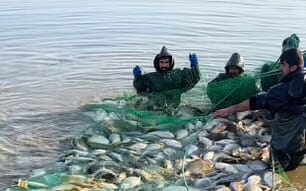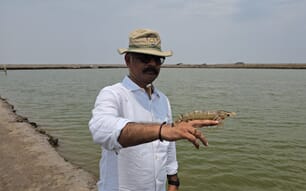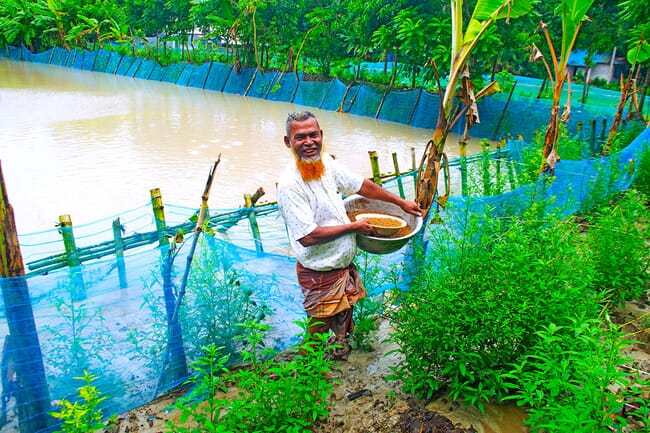
What inspired you to start a career in aquaculture?
I worked as a cook in a hotel in Dhaka, the capital, which was the only way for my family to make a living, but it was very difficult for me. So I looked for a way to make a living in my own area. I had a piece of agricultural land in Krok village, Barguna, the southernmost district of Bangladesh; which I got from my father.
In my village, the income from agriculture was low, so many people took up fish farming instead of rice cultivation and they made a lot of profit. Seeing their success, and after winning 3 lakh taka in the lottery. I left the hotel job in 2018 and returned to my village. The next year, I decided to start carp farming on my own land and leasing some other land. In the first year, I invested eight lakh taka (USD 6,600) in fish farming with my savings and some borrowed money. At the end of the year, I sold fish worth 18 lakh taka ($14,800) and made a profit of 1 million taka ($8,210). I’m now able to take care of my family and children.
Did you have any formal training?
No, I was inspired by watching others in the village and learned the techniques from them. The people from the fish feed company also give me advice. Before releasing the fry in the farm, they test the water and soil.
What is the size of your farm and what species of fish do you produce?
I have three ponds spread over 78 decimals [0.78 acres] of land. I produce carp – like rui, catla and chital – as well as pangas. I sell the fish in the local market, while fish traders buy from my farm.
What is your total production and how do you procure juveniles?
Around 80 quintals [8,000 kg] of fish each year, with a value in Bangladeshi taka of about 20 lakh [approximately $16,400].
There are many hatcheries in the southwestern part of Bangladesh that produce carp fry. and deliver them to the farm. After 6 to 7 months the fish weigh 400-500 g. From then on, we start selling them.
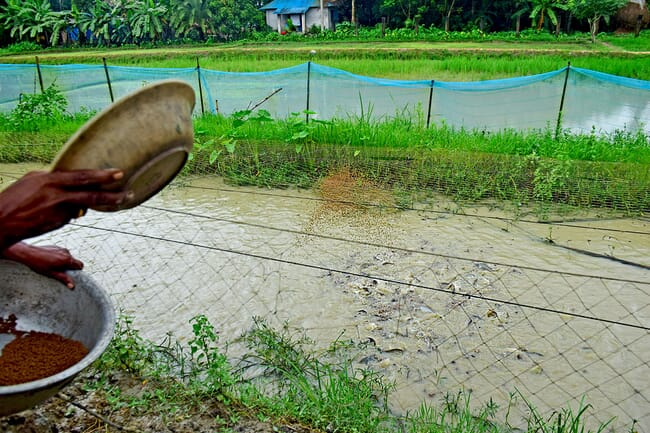
What is a typical day at your workplace?
I wake up early in the morning and rush to the farm. I first walk around the farm and check if everything is okay. My main focus is on whether the water in the farm is okay or not, whether any fish have died. If there is any problem, I try to solve it. I spend a large part of the day on the farm. When it is time to sell the fish, I have to be even more busy. Before nightfall, I visit the farm once again.
What is your biggest worry at work?
Usually, there is more worry at the beginning, when establishing the farm. Then you have to spend more time on the farm. After that, there is no special tension. However, there is a risk here because Barguna district is prone to natural disasters, including cyclones, high tides, high temperatures and heavy rains. In May 2024 I suffered a loss of about 5 lakh taka [$4,100]. And many times fish have died in the heat.
Is there any individual or organisation that has helped you in your career?
Yes, I have received support from various individuals and organisations for fish farming. I have learned techniques from neighbouring fish farmers. Representatives of fish food companies have helped me. A close relative, Nasir Uddin, regularly helps me financially. I have also taken loans from NGOs, such as Bureau Bangladesh, Muslim Aid, and Jagonari, which helped me to establish my farm.
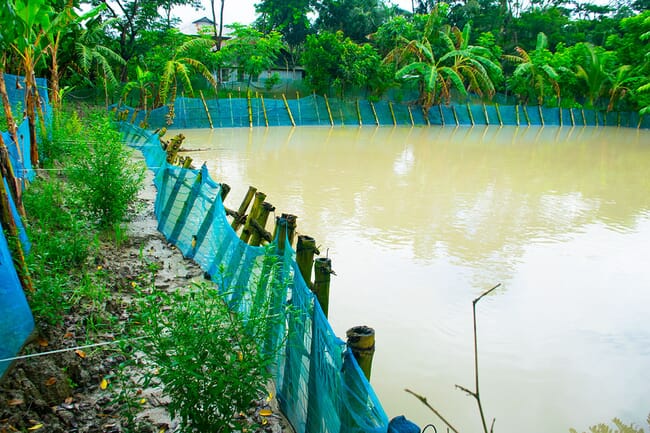
Do you have scope to keep expanding?
I have purchased some land with the profits from fish farming, so can expand the area of the farm further. But I am afraid to invest considering the prospect of more natural disasters, and the challenge of getting a fair price for our fish.
I am also getting older and will one day need to leave the responsibility of fish farming to my sons.
Do you have any advice for aspiring fish farmers?
Fish farming is a profitable sector. Once you can achieve success in fish farming with some capital, you will never look back. However, this will require dedication, honesty and sincerity. You have to learn the techniques well and acquire skills. To be profitable, you have to work hard. But it is also possible to earn good money in return for this hard work.
I would say to those who are spending money and chasing jobs, if you do fish farming, you will no longer need a job. On the contrary, it will be possible to provide jobs to many more people.



